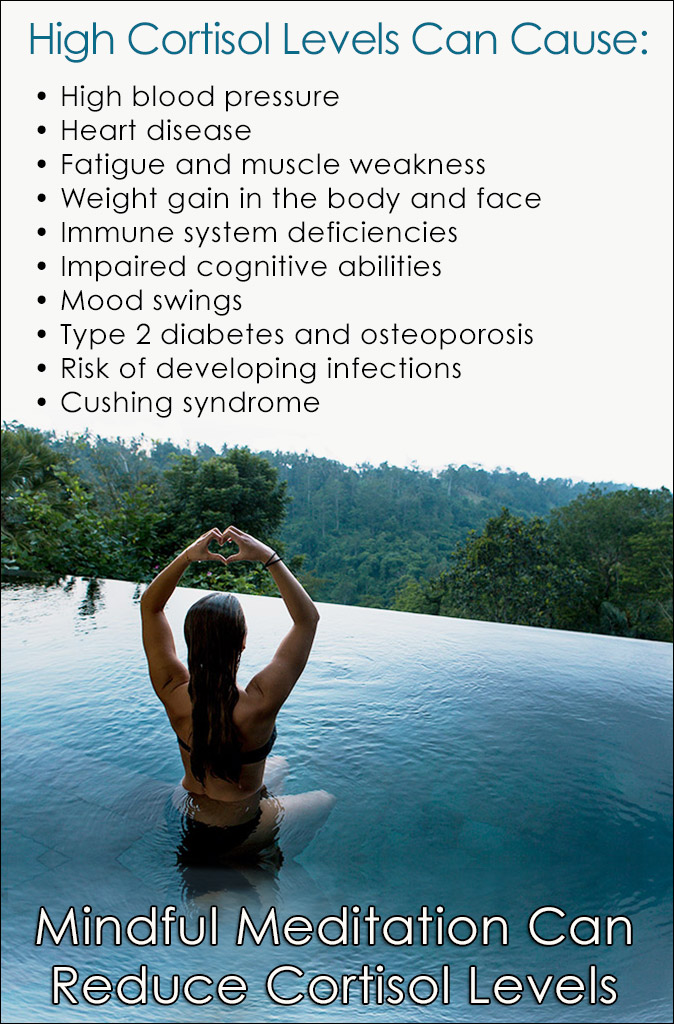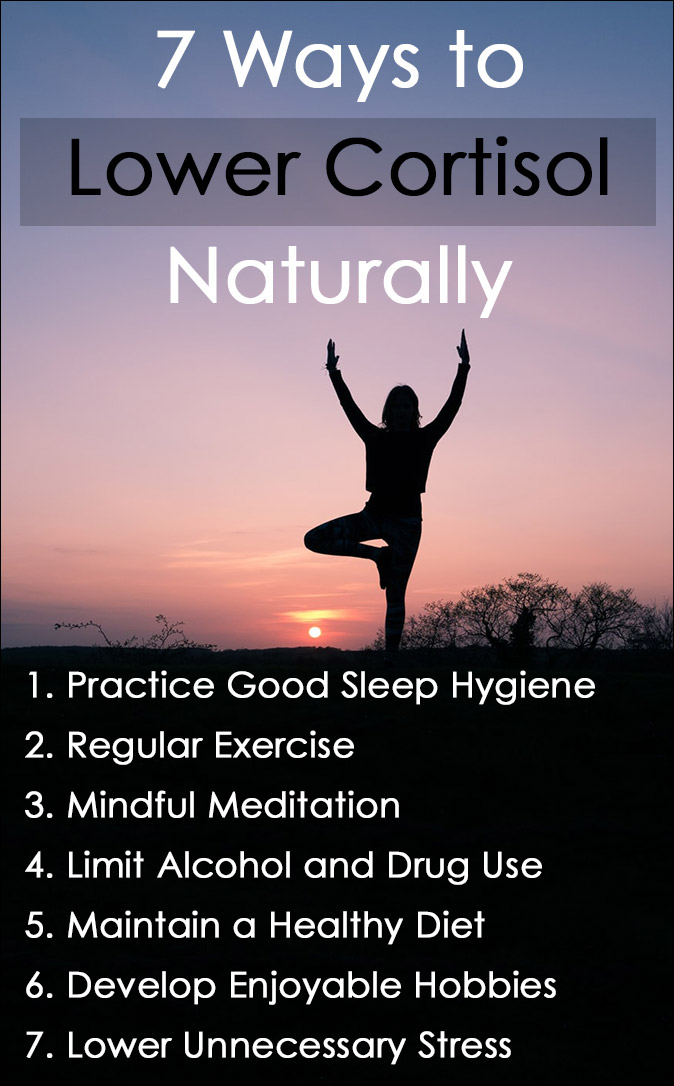
Many people want to learn how to lower cortisol levels to reduce stress and improve mental health.
Often referred to as the “stress hormone,” cortisol is an important part of our chemical makeup. Healthy cortisol levels regulate many bodily functions, such as helping us get out of bed in the morning.
Too much cortisol, however, is associated with high levels of stress, and too little of it may be tied to adrenal insufficiency, sometimes referred to as adrenal fatigue.
Fortunately, there are many ways to lower cortisol levels naturally.
What is Cortisol?
The body’s adrenal glands are responsible for the production of cortisol. In the brain, cortisol effects mood, motivation, and fear, although it is not necessarily unhealthy.
In an emergency or a dangerous situation, cortisol triggers a person’s “fight or flight” response, which is a natural instinct that helps us react during a crisis.
That’s not all this hormone does for us, though.
Unlike the happy hormones, serotonin and dopamine, cortisol is a steroid hormone that helps reduce inflammation in the body.
It helps the body break down and process carbohydrates, protein, and fat in our diets, as well controlling blood pressure and blood sugar levels.
Why Are Lower Cortisol Levels Better Than High Ones?
The hypothalamus is the part of the brain that helps regulate cortisol levels in our system. It can increase production when necessary and lower cortisol levels when it is no longer needed.
Stress and cortisol are heavily connected. Too much cortisol can be the result of chronic or toxic stress, which can lead to headaches, tension, difficulty concentrating, mood swings, and even mental health issues like depression and anxiety.
High cortisol levels may also be caused by an adverse reaction to certain medications or from an underlying health condition.
Cushing syndrome is a condition that occurs when the body produces too much cortisol for a prolonged period. It can lead to weight gain in the body and face, bruising, and slow-healing wounds.
The comedian Amy Schumer reported she was recently diagnosed with Cushing syndrome from too much of the hormone. Treatment usually focuses on lowering cortisol levels in the body.
The symptoms of too much stress and cortisol can also cause people to self-medicate with drugs or alcohol as a coping mechanism.
Whatever the case, lower cortisol levels are much healthier than higher ones because they can lead to a number of unwanted health problems.

High Cortisol Can Cause the Following:
- High blood pressure
- Heart disease
- Fatigue and muscle weakness
- Weight gain in the body and face
- Immune system deficiencies
- Impaired cognitive abilities
- Mood swings
- Conditions such as type 2 diabetes and osteoporosis
- Risk of developing infections
- Cushing syndrome
These are just a few reasons why people might want to find ways to reduce cortisol levels.
Adrenal Insufficiency and Cortisol Levels
Adrenal fatigue symptoms are sometimes confused with adrenal insufficiency and described as experiencing fatigue even after a healthy amount of sleep, feeling sad, and having physical cravings for salty foods or processed snacks.
The theory behind this syndrome is that the adrenal glands reduce cortisol because of chronic illnesses like the flu, pneumonia and bronchitis.
There is some controversy around the phrase adrenal fatigue, which was created in 1998 by a doctor that practices alternative medicine, referred to as a naturopath.
Despite the debate around adrenal fatigue, adrenal insufficiency is a medically recognized diagnosis. Here, the adrenal glands do not function normally or the pituitary glands fail to signal the adrenal glands that cortisol production is needed.
It is a relatively rare condition diagnosed by endocrinologists who specialize in the production of hormones.
Regardless of the terminology, the fact remains that unhealthy cortisol levels can be problematic, whether it is too much or too little in the body.
Tips for How to Lower Cortisol Levels
Some of the best ways to lower cortisol include the things some of us already practice.
Others, however, require a bit more discipline until they become engrained habits that will benefit us over the long-term.

7 Ways to Decrease Cortisol Levels
1. Practice Good Sleep Hygiene
“Sleep hygiene” is something of an odd term, but it means going to bed and waking up at a regular and consistent time each day, even on the weekends. The magic number for most people is to get 7 to 9 hours of restful slumber on a nightly basis.
This will help the body’s natural sleep and wake cycles, in which cortisol plays a big role.
Good sleep habits will actually improve the amount of restful, regenerative sleep a person gets by naturally balancing cortisol levels.
2. Regular Exercise
Physical activity, especially rigorous exercise, helps the body cope with added stress and cortisol. In turn, this helps the body process and decrease cortisol, providing an outlet for it.
Exercise is not only associated with better physical health, but improved mood and mental health.
What exactly constitutes rigorous exercise will certainly vary based on a person’s age and physical health.
While some people might consider rigorous exercise intense cross-training, others may simply need to start with brisk walks. Speak to your physician before starting an exercise regimen.
3. Mindful Meditation
Mindful meditation is the practice of relaxing the mind and controlling stress.
Learning how to reduce cortisol levels in the blood through meditation or mindfulness “may decrease the risk of diseases that arise from stress,” according to research.
4. Avoid or Limit Alcohol and Drug Use
Too much drug or alcohol consumption is unhealthy in many ways. First, it can lead to a substance use disorder and require drug addiction treatment.
Second, excessive alcohol intake is known to stimulate cortisol production and can prematurely speed up the aging process by increasing the risk of symptoms due to high levels.
5. Maintain a Healthy Diet
A well-balanced, nutritious diet rich in foods like fresh fruits and vegetables, whole grains, lean proteins, and fish is a good way to maintain healthy cortisol levels.
That doesn’t mean a cheat day isn’t in order here and there, but too much sugar, for instance, can increase production of the “stress hormone.”
A healthy diet also includes drinking plenty of water, staying hydrated, and eating foods that increase serotonin to improve mood and mental health.
6. Develop Enjoyable Hobbies
Having meditative activities, whether it’s gardening, painting, doing word puzzles, reading novels, or whatever you find enjoyable and relaxing in your downtime promotes good mental health, which is associated with lower cortisol levels.
7. Take Steps to Lessen Unnecessary Stress
Maybe this seems too obvious, but it’s important to say that chronic and acute stress are different conditions.
Acute stress is experiencing temporary worry due to things like a school project, an upcoming performance, or even something as normal as a first date. After the event takes place, however, the stress is relieved.
Chronic stress is experienced as a long-term condition and leads to unhealthy cortisol levels. This can be the result of toxic relationships, mental health issues, disease, physical abuse, or a stressful working environment.
Some jobs can be stressful, but they shouldn’t lead to a mental health condition. There are many jobs for people with anxiety that offer a less stressful atmosphere.
Some people might be able to easily cut stress, while others require therapy, counseling, or medical attention for an illness to overcome chronic stress.
How to Reduce Cortisol in Other Ways
There are many other ways to reduce cortisol and stress levels, and most of them will also improve mood and the way we feel mentally and physically.
The key is to find the ones that are enjoyable and easy to incorporate into a daily routine to receive the most benefit.
9 More Ways to Decrease Cortisol
- Avoid caffeine
- Laughter
- Happy Social relationships
- Spend time with a pet
- Stop smoking or quit vaping
- Practice breathing exercises
- Write in a journal
- Cognitive Behavioral Therapy
- Take supplements like Omega-3 and ashwagandha
Understanding how to reduce cortisol by using these tips can minimize stress and ultimately improve mental and physical health on a daily basis.
Related Posts
- 6 Ways to Increase GABA Naturally For Anxiety Without Benzos
Finding ways to increase GABA naturally to be less stressed out might be an alternative…
- How to Increase Serotonin Naturally - Serotonin Foods and Tips
Learning how to how to increase serotonin is beneficial because it’s a natural mood booster…
- Jobs for People with Anxiety - Low Stress Jobs
Some of the best jobs for people with anxiety are low stress jobs that involve…
